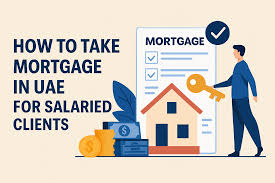Now Reading: How to Get a Mortgage for UAE Property as an Expat
-
01
How to Get a Mortgage for UAE Property as an Expat
How to Get a Mortgage for UAE Property as an Expat

Table of Contents
As an expat looking to purchase office space in Dubai or Abu Dhabi, securing a mortgage in the UAE is feasible but involves specific eligibility criteria, documentation, and processes. Below is a comprehensive guide to help you navigate the mortgage process for buying commercial property, such as office space, in the UAE, tailored to the context of your interest in top locations like Business Bay, Downtown Dubai, Al Maryah Island, or others.
Key Steps to Get a Mortgage for UAE Property as an Expat

1. Understand Eligibility Criteria
Expats, both residents and non-residents, can obtain mortgages in the UAE, but requirements vary by bank and emirate. Common criteria include:
- Residency Status:
- UAE Residents: Must be employed in the UAE for at least 6 months (salaried) or have a clean credit history (self-employed). A minimum monthly income of AED 15,000 (post-tax) is typically required, though this varies (e.g., ADCB requires AED 15,000).
- Non-Residents: Can also apply but face stricter terms, such as higher down payments (20–30% for properties up to AED 5 million, 30–50% for properties above AED 5 million).
- Age: Applicants must typically be under 65 (salaried) or 70 (self-employed) at the end of the loan term.
- Creditworthiness: A good credit score, verified via the Al Etihad Credit Bureau (AECB), is essential. Banks assess your financial stability through bank statements, salary slips, or tax returns.
- Property Type: Mortgages for office spaces are often classified as commercial loans, which may have different terms than residential mortgages. Ensure the property is in a freehold area (e.g., Business Bay, DIFC, Al Maryah Island) where expats can own property outright.
2. Choose the Right Mortgage Type
Several mortgage options are available for expats purchasing commercial properties:
- Fixed-Rate Mortgage: Offers a stable interest rate, ideal for predictable payments despite market fluctuations. Suitable for long-term planning in high-value areas like Downtown Dubai or Al Maryah Island.
- Variable-Rate Mortgage: Tied to the Emirates Interbank Offered Rate (EIBOR), with rates fluctuating based on market conditions. This may suit buyers in developing areas like JLT or Al Reem Island, where property values may rise.
- Commercial Mortgage: Specifically for office spaces, offered by banks like Emirates NBD. These may have shorter tenures and higher interest rates than residential loans.
- Offset Mortgage: Links a savings or deposit account to reduce interest payments, potentially beneficial for businesses with liquid assets.
3. Select a Lender
Several UAE banks cater to expats for commercial property mortgages. Key options include:
- Emirates NBD: Offers flexible repayment options and commercial mortgages for expats, with loan amounts up to AED 10 million and competitive rates (e.g., 6.65% p.a. reducing, linked to EIBOR).
- Mashreq Bank: Provides loans for expats earning at least AED 15,000 monthly, with personalized service and options for non-residents.
- Abu Dhabi Commercial Bank (ADCB): Features a dedicated expat banking division and attractive rates, with instant pre-approval options like ADCB Dream Home Solutions.
- HSBC UAE: Offers non-resident mortgages with up to 60% loan-to-value (LTV) ratios and dedicated relationship managers.
- Dubai Islamic Bank (DIB): Provides Sharia-compliant financing, ideal for those preferring Islamic finance options.
Tip: Use a mortgage broker (e.g., Mortgage Finder, Holborn Assets) to compare offers from multiple banks and secure competitive rates.
4. Prepare Required Documentation
Banks typically require the following documents for expat mortgage applications:
- Identity: Passport copy and UAE residence visa (for residents).
- Income Proof:
- Salaried: 3–6 months’ salary slips, employment contract, or employer letter.
- Self-employed: 6–12 months’ bank statements, tax returns, or audited financials.
- Creditworthiness: Bank statements (3–6 months) and AECB credit report.
- Property Documents: Purchase agreement, title deed, or developer’s no-objection certificate (NOC) for off-plan properties in areas like Business Bay or Al Reem Island.
- Mortgage-Specific: Proof of down payment (20–50% of property value) and mortgage pre-approval letter (if obtained).
Additional Notes: Non-residents may need extra documents, such as international bank statements or proof of global income. Syrian and Iranian buyers may face stricter LTV ratios due to bank policies.
5. Understand Costs and Fees
Purchasing office space with a mortgage in the UAE involves several costs:
- Down Payment:
- 20–25% for properties up to AED 5 million; 30–50% for properties above AED 5 million (higher for non-residents).
- Example: For a AED 1 million office in JLT, expect a minimum down payment of AED 200,000–250,000.
- Mortgage Registration Fee: 0.25% of the loan amount.
- Property Transfer Fees:
- Dubai: 4% of the purchase price (2% to Dubai Land Department, 2% to the seller).
- Abu Dhabi: 2% to the municipality, plus a AED 5,000 developer fee for new properties.
- Other Fees:
- Property valuation fee (e.g., AED 2,625 with HSBC).
- Mortgage protection insurance (mandatory) and buildings insurance (required). Costs vary based on property value (approx. 0.1% annually).
- Estate agent fees: 2% of the purchase price in both Dubai and Abu Dhabi.
- No Property Taxes: The UAE has no capital gains or property taxes, enhancing investment appeal.
6. Follow the Mortgage Application Process
- Get Pre-Approval: Obtain an Approval in Principle (AIP) from banks like ADCB or HSBC to determine your budget. This takes 10–60 minutes and helps narrow down properties in areas like DIFC or Al Bateen.
- Select a Property: Choose a freehold office space in designated areas (e.g., Business Bay, Al Maryah Island). Ensure the developer or project is on the bank’s approved list.
- Submit Application: Provide all required documents to the bank or broker. The process typically takes 1–2 weeks, depending on complexity.
- Property Valuation: The bank conducts a valuation to confirm the property’s worth, impacting the loan amount.
- Sign Mortgage Agreement: Review and sign the loan offer. Register the mortgage with the Dubai Land Department or Abu Dhabi municipality.
- Finalize Purchase: Pay the down payment, fees, and complete the transfer at the relevant Land Department. Receive the title deed upon completion.
7. Additional Considerations for Commercial Properties

- Commercial vs. Residential Mortgages: Office spaces fall under commercial mortgages, which may have higher interest rates (3–7%) and shorter tenures (up to 15–20 years) compared to residential loans (up to 25 years).
- Freehold Areas: Ensure the office is in a freehold zone where expats can own property outright (e.g., JLT, DIFC, Al Reem Island). Leasehold options (up to 99 years) are available but less common for commercial spaces.
- Residency Benefits: Purchasing property worth AED 2 million or more may qualify you for a 10-year Golden Visa, or AED 750,000 for a 2-year residency visa, enhancing your stay in the UAE.
- Leaving the UAE: If you leave the UAE with an outstanding mortgage, inform your bank. They may convert it to a non-resident mortgage with adjusted terms or require full settlement.
8. Tips for Expats
- Work with Specialists: Engage mortgage brokers like Holborn Assets, Mortgage Finder, or Clifton Private Finance to navigate complex requirements and secure better rates.
- Check Developer Approval: For off-plan offices in areas like Business Bay or Al Reem Island, confirm the developer is on the bank’s approved list to avoid financing issues.
- Plan for Fees: Budget for additional costs (e.g., transfer fees, insurance) beyond the down payment to avoid surprises.
- Monitor EIBOR: If opting for a variable-rate mortgage, track EIBOR trends, as they impact monthly payments.
- Legal Advice: Hire a local lawyer to review the purchase agreement and ensure compliance with emirate-specific regulations (e.g., Dubai Real Estate Legislation, Abu Dhabi Law No. 19 of 2005).
9. Top Banks for Expat Mortgages
- Emirates NBD: Flexible commercial loans, up to 80% LTV for residents.
- ADCB: Competitive rates, quick pre-approval for expats.
- Mashreq Bank: Comprehensive mortgage products, non-resident options.
- HSBC UAE: Non-resident loans with dedicated support.
- First Abu Dhabi Bank (FAB): Tailored solutions for high-net-worth expats.
10. Practical Example
For a AED 1.5 million office in Business Bay:
- Down Payment: AED 300,000–450,000 (20–30%).
- Loan Amount: AED 1.05–1.2 million (70–80% LTV).
- Monthly Payment: Approx. AED 7,000–9,000 (based on 6.65% reducing rate, 15-year tenure).
- Fees: AED 3,750 (mortgage registration, 0.25%) + AED 30,000 (2% Dubai Land Department) + AED 30,000 (2% agent fee) + valuation/insurance costs.
- Process: Obtain pre-approval, select an approved office tower, submit documents, and finalize at the Dubai Land Department.
Why Buy Office Space with a Mortgage in the UAE?

- Investment Potential: High rental yields (5–10% annually in areas like Business Bay or Al Maryah Island) make office spaces attractive.
- Tax Benefits: No property or capital gains taxes in the UAE.
- Residency: Property investment can lead to long-term visas, enhancing business operations.
- Business Hub: Locations like DIFC, Downtown Dubai, and Al Bateen offer proximity to clients and infrastructure, boosting your business’s visibility.
WATCH MORE: https://m.youtube.com/watch?v=TspysV8kbQM
READ MORE: Step-by-Step Guide to Buying Property in Dubai 2025





















